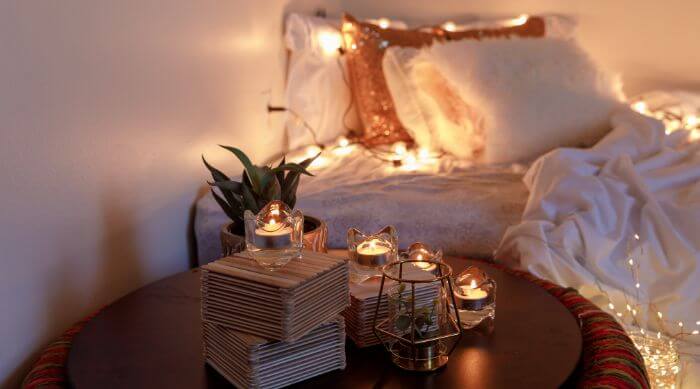If you enjoy a glass of wine at the end of the night to unwind, you’re certainly not alone. Many people use alcohol to relax after a tough work day, socialize with their friends at happy hour, or even just beat boredom.
The immediate effects of alcohol include a boost in feel-good hormones that might sound pretty good after a rough day. The thing is, those effects are short-lived. You can replace alcohol with healthier, more rewarding habits that feel even better than that buzz.
What are some ways to replace alcohol? Some ways to replace alcohol are to drink alcohol alternatives or to choose alternative activities that make you feel better than alcohol ever could.
Replacing alcohol is two-fold: Find your favorite alcohol substitutes while seeking out ways to feel your best, even more fulfilled, without alcoholic beverages.
7 Ways to Unwind
1. Try nonalcoholic versions of your favorites.
2. Wind down with alcohol-free drinks.
3. Catch up with an old friend.
Reimagining Your Happy Hour
Depending on your reasons to stop drinking, you may need to think about your routine and why you’re up for a detox or more permanent break from drinking. You may not like the side effects (hello, hangovers!) of drinking too much.
Maybe you feel your quality of life could improve if you found better ways to treat yoself than indulging in cocktails.
From there, you can start to find more positive outlets for your time and efforts that are good for your mental health. You deserve habits that don’t come with the negative effects of alcohol use.
It can be as simple as writing a letter to an old friend. (Yes, that’s still a thing, and they will love it.) It could be rearranging your favorite spaces at home for peak relaxation, rather than associating coziness with a nightly glass of your favorite spirit on the rocks.
Your new happy hour is about finding what makes you actually happy, and using other ways to fight boredom, loneliness, or a routine you’ve gotten used to that just isn’t working.
1. Try nonalcoholic versions of your favorites.
Name your favorite cocktail and there’s likely a delicious mocktail for you to taste-test as an alternative. The variety of non-alcoholic spirits, non-alcoholic beers, and dealcoholized wines out there proves there’s a market for people just like you who want alcohol alternatives.
Important note: Nonalcoholic versions of your go-to cocktails aren’t recommended for those with substance abuse or alcohol use disorders. They’re just too close to the real thing and might trigger a relapse.
If you’re having more trouble than expected as you reduce your alcohol intake or just need some help along the way, there’s support out there. You can start with your healthcare provider for medical advice on alcohol withdrawal symptoms or contact these support providers:
If your alcohol consumption isn’t problematic and you’re just cutting back, a club soda with a vodka alternative or glass of non-alcoholic sauvignon blanc can replace the “real” thing. The best part is, you won’t wake up feeling like you had the “real” thing.
2. Wind down with alcohol-free drinks.
If you don’t want your alcohol-free drinks to resemble your favorite cocktails, there are quite a few delicious options out there for you to try to ease into the night. We’re not talking about water, either, although a glass of H2O is always best if you’re feeling parched.
Reach for wellness drinks like kombucha if you’re trying to boost your gut health after years of evening cocktails. Herbal teas like chamomile come with added health benefits of reduced stress and better sleep.
If you don’t mind a little caffeine as the sun goes down, green tea is rich in antioxidants and may just help you lose or maintain your weight. No matter what your personal wellness goals, there’s likely an alcohol-free beverage out there that can help you get there.
For those who are really missing their evening glass of red wine, you can have the positive effects of reds without the alcohol. With Surely, you don’t even have to order a bottle online anymore, either. We’re available for in-store purchases near you!
3. Catch up with an old friend.
If the last few years has taught us anything, it’s that it can get lonely out there. Reaching out to loved ones that you haven’t heard from in a while isn’t just a good way to pass the time as the day winds down. A strong social network is good for your mental health.
This is especially true if you’ve been struggling as you navigate a sober lifestyle and your friends support you in your efforts to cut back.
This can help the friend on the other side of the phone, too. Hearing from you for the first time in a long time may give that friend some of the warm fuzzies they’ve been missing in their own lives.
Try scheduling those virtual or in-person moments with friends around times you may be tempted to drink. If you know you’re going to have a rough week at work, plan a phone date with a pal you haven’t talk to in a while.
4. Laugh.
It turns out laughter may actually be the best medicine. If you’re feeling a little off as you moderate your drinking, a good guffaw could actually make you feel better.
In the short-term, laughing releases endorphins and dopamine that can help you overcome stress. It can make you feel more relaxed in the moment. That may be why some people use humor to cope with uncomfortable situations — laughter genuinely makes us feel better.
Laughter can also help you in the long-term. That reduced stress you feel from regular laughter is good for your body. Lower levels of oxidative stress can mean a healthier immune system, reduced chronic pain, even a reduced risk of developing conditions like cardiovascular disease.
Yes, you can laugh your way to a healthier heart.
Think of the last great dad joke you heard. Put on your favorite funny movie. Have a dance party in your living room. Get yourself in as good a mood as possible before bed for a solid night’s rest.
5. Adjust your lights.
Light is a powerful thing. You may have heard about the positive effects of light therapy boxes on seasonal affective disorder (SAD), a type of depression some people experience when the seasons change in fall and winter. The boxes mimic sunlight and potentially lift your mood in the process.
You don’t need to feel SAD to use strategic lighting at home, though. If you’ve been feeling a little down, especially as you cut back on drinking, the secret to a better mood could be in your space.
If you have natural light at home, arrange your seating to take advantage of any sunlight that comes in throughout the day. If you work from home, set up shop where you can enjoy some of that natural light for at least a few hours of your day.
For spaces that are less greenhouse and more cave-like, you can use artificial lighting to create the desired effects. Bright lighting is best for focus. Cool colors like blue and green are best if you need a calming effect or are dealing with the Sunday scaries.
Light in the warm range (2,700 to 3,000 Kelvin) is best for an overall soothing effect. These bulbs are often described as “soft white,” but they may give off a subtle yellow or orange hue. The goal is to feel like you’re in front of a flickering fireplace. Sounds pretty cozy, right?
Not into fancy lights? Get a candle or 3 and lean into that cozy ambience the old fashioned way!
6. Clean the closet you’ve been avoiding.
Clutter and mess can contribute to anxiety, depressive symptoms, and feelings of tension. The good news is, tidying up can have the opposite effect.
A clean home can help you feel more in control of your life. This is something you can do that’s entirely up to you, and that’s even more empowering when life is feeling a little chaotic.
There’s a sense of accomplishment with finishing a task like organizing a messy closet or going through that dusty box in the garage. If you’re a remote worker, you may feel a renewed sense of focus in an organized space.
Just think: There’s usually no dirty laundry on the floor of an office.
If it’s been a while since you organized or gave your pad a deep clean, start small. Set aside a reasonable amount of time to tackle a room, even a corner, so you’re not leaving things unfinished and causing more anxiety.
For a quick pick-me-up before bed, by the way, a fresh set of sheets is a great way to get better sleep.
Once you’re done with your task, reward yourself with some self-care. Keep it simple. Get outside, unplug with your favorite show for an hour, or sleep in the next Sunday morning.
7. Try meditation.
Mindfulness practices like meditation can do wonders for your well-being, especially at the end of the day. A regular meditation practice decreases stress, helps you refocus, and calms your mind.
If you’re just not sure you have the patience for something like guided meditation, take baby steps toward a more mindful you. Adopt a mantra, sign up for evening tai chi classes, or start with yoga. Find a way to relax your body and your mind that works for you.
For those who can’t seem to sit still, try letting your thoughts wander on a walk around the neighborhood. That’s a type of reflection, too, and movement is a great habit to incorporate into your routine when you quit alcohol.
Ready to embrace moderation?
For those who had a really good Dry January or want to cut back short-term, you can replace alcohol with healthier habits that make you feel good. At Surely, we know it may not be easy to make those changes. That’s why we’re here with options that don’t feel as hard.
Need a little fizz in your life? Celebrate the new you with our non-alcoholic sparkling Brut, also available in cans.
Sources
- Therapeutic effect of high-dose green tea extract on weight reduction: A randomized, double-blind, placebo-controlled clinical trial
- The correlation of social support with mental health: A meta-analysis
- The Laughter Prescription
- Therapeutic Benefits of Laughter in Mental Health: A Theoretical Review
- Associations of Frequency of Laughter With Risk of All-Cause Mortality and Cardiovascular Disease Incidence in a General Population: Findings From the Yamagata Study
- The Efficacy of Light Therapy in the Treatment of Seasonal Affective Disorder: A Meta-Analysis of Randomized Controlled Trials
- Effect of Light Color Temperature on Human Concentration and Creativity
- Mindfulness mediates the physiological markers of stress: Systematic review and meta-analysis




![How to Stop Drinking [Temporarily or Forever]](https://dropinblog.net/34240221/files/featured/how-to-stop-drinking.jpg)

![Here are the best 16 ways to say “no” to alcohol [sans awkwardness]](https://dropinblog.net/34240221/files/Blog_Post_Images/saying_no_to_alcohol.jpg)